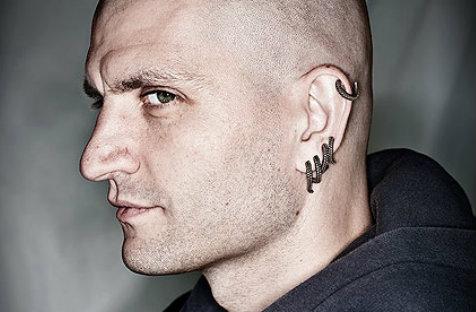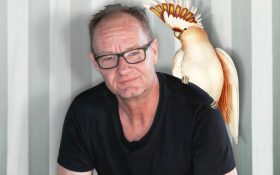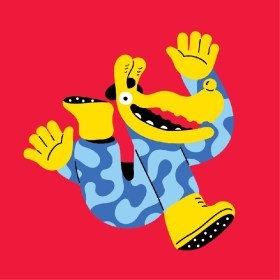Perth-based writer and reviewer Carol Flavell Neist is writing a daily diary detailing her Writers’ Festival highlights, with a special focus on speculative fiction: read her coverage of day two here and day three here.
Perth Writers Festival is well-established in the city’s arts calendar, and since moving to the grounds of the University of Western Australia it has grown enormously in popularity. The combination of one of the country’s loveliest campuses with a multiple-choice program of world-class speakers is irresistible to anyone who reads, writes or edits. All genres are represented, and the family day on the Sunday caters specifically for children, so there is something for everyone at this annual event.
This was the first time I had attended all three days, yet it hardly seemed enough! With anything up to six talks and panels running at once, it just isn’t possible to attend everything. I went to something in almost every time slot, but sadly, I had to miss some sessions that I know I would have loved. Bi- or even tri-location would have been needed to visit them all.
As a speculative fiction geek, I aimed to follow the surprisingly numerous genre authors. Literary festivals have learnt in the last decade or two that it’s essential to cater for all tastes, and this time spec-fic was the genre most heavily represented. Two overseas guests of honour, Margaret Atwood and China Miéville, have clear bents in that direction, as do several of the local writers, including Isobelle Carmody. Others, such as Lawrence Norfolk, certainly cast glances towards the speculative, so there was plenty for me choose from.
Friday started with Norfolk’s talk on his opus John Saturnall’s Feast (a fascinating work about a poor boy who rises to be the most famous chef in the land – you can read my review here). Norfolk explained how he was inspired by the huge kitchens of Ham House, a medieval manor near his Somerset home that could cater for up to 600 people. He also read cook books from the Civil War period, and completely changed his perceptions of English cooking. No baked beans on toast here: John Saturnall’s Feast shows us the true depth of English cuisine, much of which, sadly, was lost during the hard times of two world wars.
Next came a panel on criticism, involving New York book critic John Freeman, Sydney’s James Bradley (an SF writer who recently won the Pascall Prize for Criticism) and Geordie Wiliamson, Chief Literary Critic of The Australian. In conversation with moderator Stephen Romei, this entertaining trio discussed the possible pitfalls of being a critic. All three are both authors and critics, and all had experienced either giving or receiving a bad review and having to studiously avoid the topic when meeting the other party socially. In any city, writing and criticism constitute a small world, and the trio agreed that it’s essential to try to be kind, remembering that there is a human being on the other end of the criticism, no matter how hard we try to separate an author from his or her work. Perhaps we should all take a leaf from the book of The London Review of Books. This organ apparently does not like its reviewers to express an opinion. ‘That would be vulgar,’ said Williamson with a grin.
Then on to the highlight of the day, a conversation between the main Guests of Honour, with Geordie Williamson in the chair. I must admit that I approached this session with some trepidation. The day before, I had been invited to a talk by China Miéville at one of the local universities. He obviously thought it imperative that he wear his academic hat for this event (he teaches Creative Writing at Warwick University) for he kept using words such as ‘eschatology’ and ‘heuristics’, even working them into the same sentence at least once.
But there was little of that today, although at one point Miéville did slip up and use ‘hegemony’. Nevertheless, he and Margret Atwood were a hoot from start to finish. Before the audience was seated, they were already in situ, with Atwood adjusting Miéville’s sleeve so she could photograph his tattoos with her mobile phone. They went on to josh each other like a pair of stand-up comics who have shared the same gig many times before.
Miéville described his recent book Railsea as ‘Moby Dick with trains and moles’. Atwood said it was steampunk. ‘But it’s a diesel train!’ objected Miéville. After some discussion on genre, the pair agreed that it was more probably ‘salvage punk’.
Asked why there was no sex in his novels, Miéville said he didn’t think he could write good sex scenes. Atwood countered that this was not surprising, seeing as he ‘kept putting tentacles in it’.
On a more serious note, they covered wide-ranging topics including the origins of speculative fiction and the contrast between James Joyce and Rudyard Kipling. They agreed that literature is unlikely to save the world or even alter people’s opinions very much. ‘It’s possible to be a horrible person and still read beautiful books,’ Miéville concluded.
Some advice to ‘blocked’ writers from the experts: Atwood suggests going for a walk or a run, or doing some ironing. Miéville suggests writing 200 words, even if they are rubbish, then going away and doing something else before writing another 200. Atwood ended the session by announcing that she had Tweeted her pic of Miéville’s tats!
After that encounter, the next talk, Robert Dessaix in conversation with Rosemary Sayer, was somewhat anti-climactic. Dessaix, however, is, like Atwood and Miéville, a professional of many years’ experience and despite his recent ill-health, he chatted and joked at length, camping it up as only an experienced entertainer can. The talk reflected the tone of his latest book, As I was saying, in which he discusses travel, swearing, dogs and ‘the pleasure of idleness’.
All in all, an excellent day of entertainment and scholarship. I went home too excited to sleep – but when I did, it was the sleep of an exhausted mind and body! Believe me, I needed that nine hours of sleep to prepare for the next long day!
Perth Writers’ Festival
University of Western Australia
21 – 23 February
Perth Festival 2013
www.perthfestival.com.au
8 February – 2 March





